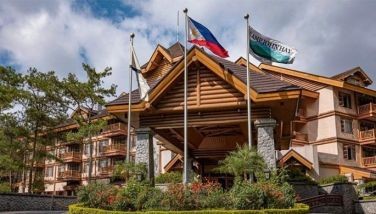Educational TV project launched in Tawi-Tawi
November 12, 2005 | 12:00am
BARANGAY DARUL AKRAM, Languyan, Tawi-Tawi — "Peace in Mindanao benefits all Filipinos, not just the people of Mindanao."
That was the assessment of James Kunder, Assistant Administrator for Asia and the Near East of the US Agency for International Development (USAID), following launching ceremonies here last Wednesday that connected Languyan Central Elementary School to the Knowledge Channel, marking the entry of educational television (ETV) to the BASULTA (Basilan, Sulu, Tawi-Tawi) region of Western Mindanao.
The three-year project aims to provide 150 public schools in the Autonomous Region in Muslim Mindanao (ARMM) with connections to the Knowledge Channel.
The project last year installed 41 satellite dishes, digital receivers and television sets in public schools in Maguindanao and Lanao del Sur. This year, 15 schools in Tawi-Tawi and 12 in Basilan will be connected. The third year of the project will target Sulu and other municipalities in Maguindanao.
The Languyan launch was attended by Rina Lopez-Bautista, president of the Knowledge Channel Foundation, Tawi-Tawi Gov. Sadikul Sahali and Jim Oprecio, deputy chief of party of the Alliance for Mindanao Off-grid Renewable Energy (AMORE) program, which provides far-flung communities like Languyan with solar energy. AMORE is also funded by the USAID.
Kunder, US Embassy chargé d’affaires Paul Jones and USAID-Philippines mission director Jon Lindborg were on a three-day tour of Mindanao to inspect USAID projects in the region.
Last Tuesday, they inaugurated the USAID-financed improvements of the Siocon port that included expanded berthing and mooring facilities and a new roll-on, roll-off (ro-ro) ramp. Siocon was the site of a vicious attack by 100 Moro Islamic Liberation Front (MILF) rebels in 2002.
Kunder told The STAR that about 60 percent of US foreign assistance for the Philippines goes to projects in conflict areas or former conflict areas in Mindanao. USAID-funded projects in the country total some $85 million this year, the second highest in the region next to Indonesia.
"The absence of peace (in Mindanao) hinders investment all over the country, not just in Mindanao," Kunder noted.
"The ultimate responsibility for economic progress and peace in this region rests with local leaders and the people themselves," he said during the turnover in Siocon, adding that "we are truly pleased to be able to... help those who are committed to peace in Mindanao and who have the vision to see a brighter tomorrow."
Kunder noted that while USAID-funded projects are "relatively small," such as the Siocon port, irrigation canals for small farms, computer and ETV connections for public schools, "there have been positive reactions from the citizens" at every stop they have made on this tour.
"The real impact (of USAID projects) is in the morale of the people," he added. "It gives hope for some prosperity and a better future for the people of Mindanao."
For the foreseeable future therefore, USAID funding will continue with this thrust. "There are important things being done in the country," he said. "If peace talks with the MILF succeed, (USAID) would consider additional funding" for projects to reintegrate rebel returnees.
Through the Growth with Equity in Mindanao (GEM) program, USAID already funds livelihood projects such as fishing, aquaculture and carageenan farming for rebel returnees in Mindanao.
Kunder, however, reiterated concern that the aid package to the Philippines might be limited if the country does not step up efforts to fight human trafficking. Despite the passage in 2003 of Republic Act 9208 or the Anti-Trafficking in Persons Act, Kunder noted that there have been no convictions so far.
The annual assessment of the problem might therefore result in the Philippines slipping from its current Tier 2 status, which indicates that a country is doing something to combat human trafficking, to Tier 3, which means a country is not doing enough to combat trafficking.
Under current US laws, a Tier 3 rating could lead to limitations in the recipient country’s aid package.
Kunder said he discussed the issue with President Arroyo during a courtesy call on Malacañang last Monday.
"I think the government understands the problems are serious and is taking steps to address them," he said.
While the passage of the anti-terrorism law is "something that the US government greatly encourages," Kunder clarified that, unlike human trafficking, it is not prescribed by law to be directly tied to aid programs.
That was the assessment of James Kunder, Assistant Administrator for Asia and the Near East of the US Agency for International Development (USAID), following launching ceremonies here last Wednesday that connected Languyan Central Elementary School to the Knowledge Channel, marking the entry of educational television (ETV) to the BASULTA (Basilan, Sulu, Tawi-Tawi) region of Western Mindanao.
The three-year project aims to provide 150 public schools in the Autonomous Region in Muslim Mindanao (ARMM) with connections to the Knowledge Channel.
The project last year installed 41 satellite dishes, digital receivers and television sets in public schools in Maguindanao and Lanao del Sur. This year, 15 schools in Tawi-Tawi and 12 in Basilan will be connected. The third year of the project will target Sulu and other municipalities in Maguindanao.
The Languyan launch was attended by Rina Lopez-Bautista, president of the Knowledge Channel Foundation, Tawi-Tawi Gov. Sadikul Sahali and Jim Oprecio, deputy chief of party of the Alliance for Mindanao Off-grid Renewable Energy (AMORE) program, which provides far-flung communities like Languyan with solar energy. AMORE is also funded by the USAID.
Kunder, US Embassy chargé d’affaires Paul Jones and USAID-Philippines mission director Jon Lindborg were on a three-day tour of Mindanao to inspect USAID projects in the region.
Last Tuesday, they inaugurated the USAID-financed improvements of the Siocon port that included expanded berthing and mooring facilities and a new roll-on, roll-off (ro-ro) ramp. Siocon was the site of a vicious attack by 100 Moro Islamic Liberation Front (MILF) rebels in 2002.
Kunder told The STAR that about 60 percent of US foreign assistance for the Philippines goes to projects in conflict areas or former conflict areas in Mindanao. USAID-funded projects in the country total some $85 million this year, the second highest in the region next to Indonesia.
"The absence of peace (in Mindanao) hinders investment all over the country, not just in Mindanao," Kunder noted.
"The ultimate responsibility for economic progress and peace in this region rests with local leaders and the people themselves," he said during the turnover in Siocon, adding that "we are truly pleased to be able to... help those who are committed to peace in Mindanao and who have the vision to see a brighter tomorrow."
Kunder noted that while USAID-funded projects are "relatively small," such as the Siocon port, irrigation canals for small farms, computer and ETV connections for public schools, "there have been positive reactions from the citizens" at every stop they have made on this tour.
"The real impact (of USAID projects) is in the morale of the people," he added. "It gives hope for some prosperity and a better future for the people of Mindanao."
For the foreseeable future therefore, USAID funding will continue with this thrust. "There are important things being done in the country," he said. "If peace talks with the MILF succeed, (USAID) would consider additional funding" for projects to reintegrate rebel returnees.
Through the Growth with Equity in Mindanao (GEM) program, USAID already funds livelihood projects such as fishing, aquaculture and carageenan farming for rebel returnees in Mindanao.
Kunder, however, reiterated concern that the aid package to the Philippines might be limited if the country does not step up efforts to fight human trafficking. Despite the passage in 2003 of Republic Act 9208 or the Anti-Trafficking in Persons Act, Kunder noted that there have been no convictions so far.
The annual assessment of the problem might therefore result in the Philippines slipping from its current Tier 2 status, which indicates that a country is doing something to combat human trafficking, to Tier 3, which means a country is not doing enough to combat trafficking.
Under current US laws, a Tier 3 rating could lead to limitations in the recipient country’s aid package.
Kunder said he discussed the issue with President Arroyo during a courtesy call on Malacañang last Monday.
"I think the government understands the problems are serious and is taking steps to address them," he said.
While the passage of the anti-terrorism law is "something that the US government greatly encourages," Kunder clarified that, unlike human trafficking, it is not prescribed by law to be directly tied to aid programs.
BrandSpace Articles
<
>
- Latest
- Trending
Trending
Latest
Trending
Latest
Recommended































